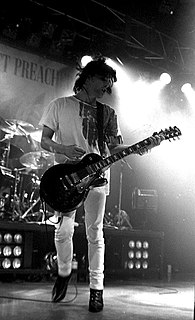A Quote by Russell Means
Children in poverty aren't trying to get out of poverty; they're just trying to rip off a pair of Nikes. So we Indian people are a microcosm of what's happening in America. We are now consumers, and our culture has gone.
Related Quotes
I think our culture right now is a culture that's trying to find itself. They're trying to figure out what is it? Is it social media followers? Is it trying to be popular? Is it money? Is it fame? Is it power? They're searching for identity and so many of us have been there, and we'll get back to that place of what is our identity? Who are we? More importantly, whose are we? For me, I find my identity in a relationship with Christ.
Hunger, disease and poverty can lead to global instability and leave a vacuum for extremism to fill. So instead of just managing poverty, we must offer nations and people a pathway out of poverty. And as president I've made development a pillar of our foreign policy, alongside diplomacy and defense.
We measure poverty by what I believe is a very, very crude concept. We actually measure poverty by trying to get some kind of an estimate of the minimum expenditures on food that are required to maintain health, multiplying that number by three, and saying that's the level of poverty. And it's a very crude, inaccurate arrangement.
One of the most durable successes of the war on poverty was to dramatically reduce the number of elderly poor in America. That's still true today. But, by contrast, child poverty has shot up over the last few years: A decade ago, about 16 percent of children in America were poor - which is a shockingly high percentage. But it's not as shocking as today, when we see that 22 percent of kids live in poverty.
The stress that we [with Abilities] always feel is trying to continue advancing with our music. That's our plight, it's ingrained in our personalities. We feel like we're trying to race the world of music itself - just trying to create the best music, and as soon as we get done with one piece we're trying to figure out how to top it.
We're looking at the singular condition of poverty. All the other individual problems spring from that condition... doesn't matter if it's death, aid, trade, AIDS, famine, instability, governance, corruption or war. All of that is poverty. Our problem is that everybody tries to heal each of the individual aspects of poverty, not poverty itself.






































